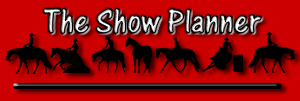 |
|
Show Horse Promotions Mary Murray
|
Does Your Performance Horse Have an Attitude Problem or a Gastric Ulcer?When your normally well-behaved horse starts acting strangely, what do you do? Do you immediately think he's developing an attitude or do you look for other causes? If your horse demonstrates any or all of the behaviors below you may want to think twice before assuming he has an attitude problem:
While these may seem like a group of unrelated symptoms, they're not. They are common symptoms in horses with ulcers. Veterinarians and other researchers have recently recognized gastric and colonic ulcers as serious health threats, especially among performance horses or horses in training. The reasons ulcers are so common among these horses include:
Since most of the research has focused on gastric ulcers, we know quite a bit about the factors that cause them. One of the major causes is inadequate access to free choice hay or pasture. Horses are meant to eat continuously, so their stomachs secrete acid constantly. When they are able to graze constantly they secrete saliva, which has a buffering effect on the stomach acid. Plus, the hay or grass forms a fibrous mat-like barrier between the acid in the lower portion of the stomach (where digestion is occurring) and the upper portion of the stomach, which cannot tolerate contact with the acid. The lower part of the stomach is protected by mucous while the upper part is not, so ulcers tend to form when acid moves into the upper portion of the stomach. Exercise or a heavy training schedule is the second factor that can lead to gastric ulcers. When a horse exercises, he contracts his abdominal muscles, disrupting the protective fibrous mat and forcing acid into the upper portion of the stomach. Performance horses living in stalls may tense their abdominal muscles even when they are not exercising since regular barn activities may prevent them from fully relaxing, especially if they are not offered free choice hay to occupy their time. In contrast, horses living in pasture move about slowly in a relaxed manner. A third cause of ulcers in performance horses is trailering. Horses must frequently tense their abdominal muscles to maintain balance in a moving trailer, which tends to have the same effect as heavy exercise. Since many people do not offer hay when hauling, their horses are faced with long, uncomfortable rides. It's no wonder that many horses start kicking and pawing in the trailer! Finally, saddling and tightening the girth can cause your horse to tighten his muscles, forcing the acid into contact with any existing ulcers and aggravating ulcer pain. The association point for the stomach meridian lies under the back of the saddle where the ribs join the spine. If you suspect that your horse has ulcers, put light pressure on this point to see whether your horse has a pain response. When a horse must be kept in training treating ulcers can be challenging. Most pharmaceutical products designed to treat ulcers act by blocking acid secretion. While this may be effective on a short term basis, it eventually interferes with proper digestion and adversely affects the health of the digestive system. Keeping your horse in as natural an environment as possible is best, including offering free choice hay, building digestive health, and providing nutritional support so the body can rapidly heal the ulcerated tissue. For nutritional support, I like to use the Cell Tech regular EssentialsT, which provide probiotics, digestive enzymes and blue green algae to support and heal the digestive system. I have also had success with a new product called SucceedTM, which is also designed to support, protect and heal the digestive tract without interfering with normal acid production. I have done some field testing with this product and have been very impressed with its effect on the behavior of horses with ulcers who had not responded completely to other measures. Tahitian Noni Juice is another good food based nutritional supplement to help your performance horse handle the rigors of training and competition. The natural anti-inflammatory properties of Noni juice allow the horse to recover faster and have less muscle soreness. Horses can't use words to communicate with us so they have to send us signals when things aren't right. How many times do we confuse their attempts to communicate with a bad attitude? When a horse is punished for trying to communicate it causes him even more stress and discomfort, and the downward spiral continues. How many good horses have had their careers cut short because of discomfort from ulcers? Try supporting your horse's digestive tract and see how his performance and attitude improve. Contributed By: Madalyn Ward, DVM
|
||||||||||||||||||
|
© 2000 - 2010 Show Horse Promotions The Show Horse Promotions web site is an informational web site, this information is subject to change without notice. Any use of, or actions taken based upon any of the information contained on this web site is done entirely at your own risk. Show Horse Promotions expressly prohibit you from republishing or redistributing this content without first receiving our written consent. By using this site, you agree not to hold us liable for any errors or delays in this content, or for any actions that you take in reliance thereon. This site contains links to other Internet sites. These links are not endorsements by us of any products or services in those sites, and we have not endorsed or approved any information in those sites. |
|
||||||||
